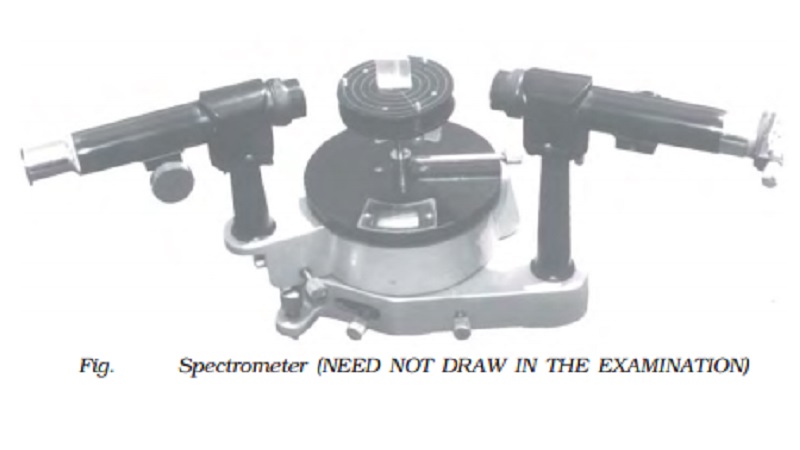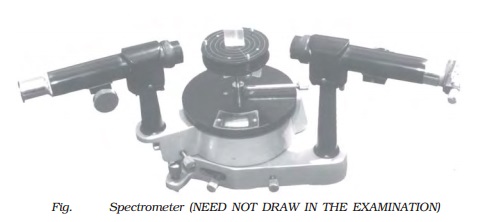Chapter: 11th 12th std standard Class Physics sciense Higher secondary school College Notes
Basic Parts and Adjustments of the spectrometer

Spectrometer
The spectrometer is an
optical instrument used to study the spectra of different sources of light and
to measure the refractive indices of materials (Fig. ). It consists of
basically three parts. They are collimator, prism table and Telescope.
Collimator
The collimator is an
arrangement to produce a parallel beam of light. It consists of a long
cylindrical tube with a convex lens at the inner end and a vertical slit at the
outer end of the tube. The distance between the slit and the lens can be
adjusted such that the slit is at the focus of the lens. The slit is kept
facing the source of light. The width of the slit can be adjusted. The
collimator is rigidly fixed to the base of the instrument.
Prism table
The prism table is
used for mounting the prism, grating etc. It consists of two circular metal
discs provided with three levelling screws. It can be rotated about a vertical
axis passing through its centre and its position can be read with verniers V1
and V2. The prism table can be raised or lowered and can be fixed at
any desired height.
Telescope
The telescope is an
astronomical type. It consists of an eyepiece provided with cross wires at one
end of the tube and an objective lens at its other end co-axially. The distance
between the objective lens and the eyepiece can be adjusted so that the
telescope forms a clear image at the cross wires, when a parallel beam from the
collimator is incident on it.
The telescope is
attached to an arm which is capable of rotation about the same vertical axis as
the prism table. A circular scale graduated in half degree is attached to it.
Both the telescope and
prism table are provided with radial screws for fixing them in a desired
position and tangential screws for fine adjustments.

Adjustments of the
spectrometer
The following
adjustments must be made before doing the experiment with spectrometer.
(i) Adjustment of the
eyepiece
The telescope is
turned towards an illuminated surface and the eyepiece is moved to and fro
until the cross wires are clearly seen.
(ii) Adjustment of the
telescope
The telescope is
adjusted to receive parallel rays by turning it towards a distant object and
adjusting the distance between the objective lens and the eyepiece to get a
clear image on the cross wire.
(iii) Adjustment of the
collimator
The telescope is
brought along the axial line with the collimator. The slit of the collimator is
illuminated by a source of light. The distance between the slit and the lens of
the collimator is adjusted until a clear image of the slit is seen at the cross
wires of the telescope. Since the telescope is already adjusted for parallel
rays, a well defined image of the slit can be formed, only when the light rays
emerging from the collimator are parallel.
(iv) Levelling the
prism table
The prism table is adjusted or levelled to be in horizontal
position by means of levelling screws and a spirit level.
Related Topics